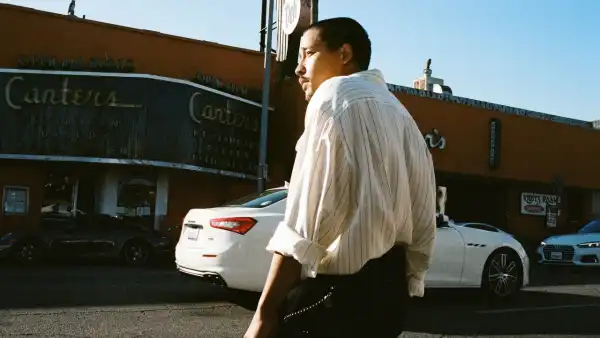
Save this storySave this storySave this storySave this story
Dijon Dueñas’s voice is one destined for TV singing competitions and gospel choirs, haunting ballads and slow jams. It’s elegant and twisty, moaning and whining, often stretching and stretching into strange, surprising places. Interestingly, Dijon, a 33-year-old composer, barely shows off this talent, placing his voice in lo-fi, experimental arrangements. When he began releasing solo music in 2017, his compositions combined Frank Ocean-inspired R&B with Americana and folk; his singing was raw and dreamy, and his productions were largely limited to guitar and gentle percussion. His early singles and EPs felt strangely detached from time or place, tradition or roots—they were cool and a little tentative, the work of a talented twenty-something making genre-bending music with just a guitar and a laptop.
Growing up, Dijon never lived anywhere for more than a few years; his home was whichever military base his parents were stationed at, whether in Germany, Hawaii, or Iowa. His father is from Guam and his mother is from the American South, with ethnicities “a mixed bag—black, Native, white,” he told Pitchfork in 2022. Perhaps that’s why Dijon’s music has the feel of a wanderer, a seeker, a man who never quite fits into a box. On his 2020 EP How Do You Feel About Getting Married?, he achieved a raspy, jagged indie-pop sound that drew inspiration primarily from Prince and Ocean, but also from Animal Collective, Bill Callahan, Jodeci, and Arthur Russell. The songs were still scrappy and homespun, a collection of demo-worthy cuts, but their magic was undeniable. Perhaps it was his voice that gave these tracks their weight; perhaps it was his drive to explore, his relentless desire to find a sound he could confidently call his own.
Dijon’s 2021 debut studio album, Absolutely, subtly, almost imperceptibly, reimagined what contemporary pop music could sound like. (The record didn’t chart or receive widespread critical acclaim, but in the intervening years, Dijon has gone on to collaborate with Justin Bieber and Bon Iver, and has spawned a slew of followers.) Absolutely rejects the assumption that perfection is the highest form of sonic pleasure, that glossy, digital production and tight song structure result in more meaningful music than the free, improvisational form. Dijon created much of the project in a spare room in his house, with his friends improvising with one another in a competitive, virtuosic manner, chatting, shouting, and harmonizing while laying tape over an omnidirectional microphone. You can almost taste the sweat, the crushed beer cans, the sunrise filtering through the blinds. (The album’s gorgeous live performances recreate that dizzying, delicious experience.) Michael Gordon, the vocalist and guitarist better known as Mk.gee, whose 2024 album Two Star & the Dream Police made him a cult superstar, helped Dijon achieve this new, passionate sound. “We were both trying to find a new instrument to invent separately, and kind of wondering why no one else was achieving it as feverishly or, as they say, awkwardly,” Dijon told the Times last September. “And then we both thought, Let’s see how far we can go for each other.”
On Dijon’s second full-length album, Baby, out Friday, he takes his creative partnership with Mk.gee and others to new heights. With collaborators like Andrew Sarlo, Henry Kwapis, and BJ Burton, Dijon maintains the loose, analog approach he used on Absolutely while once again pushing the potential parameters of popular music. Distorted drum samples collide with shimmering synth keys; piano is amplified and fragmented; warm electric guitar riffs dissolve into noisy effects, FM radio rips, and the occasional Wu-Tang Clan sample. The use of samples here is particularly innovative: On Baby, it’s often impossible to distinguish between sample and recorded instrument, authenticity and manipulation. Vocals are sped up to squiggles, instruments are swapped and gated, percussion slaps you in the face and then disappears. Take “Another Baby!” is frenetic in its construction: bizarre synth stabs and alien shrieks are woven into a bombastic pop number that sounds like it could have been released at any point in the last forty years. When Dijon screams about having a second child with his partner—“Let’s make a baby! Another one!”—his screeching vocals break off and disintegrate. There doesn’t seem to be a single moment where he pauses to catch his breath.
Sourse: newyorker.com






